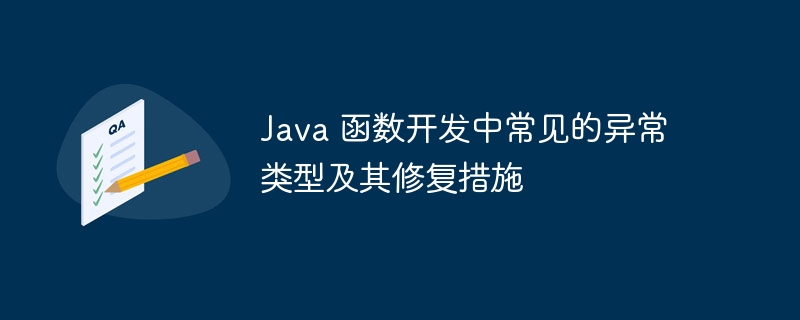Home >Java >javaTutorial >Common exception types and their repair measures in Java function development
Common exception types and their repair measures in Java function development
- 王林Original
- 2024-05-03 14:09:01984browse

Common exception types and their repair measures in Java function development
In the process of Java function development, you may encounter various exceptions. Affects the correct execution of the function. The following are common exception types and their repair measures:
1. NullPointerException
- Description: When accessing an uninitialized object.
- Fix: Make sure to check the object for non-null before using it.
Sample code:
try {
String name = null;
System.out.println(name.length());
} catch (NullPointerException e) {
System.out.println("Name is null, cannot access length.");
}2. IndexOutOfBoundsException
- Description: Thrown when trying to access a non-existent index in an array or collection.
- Fixing measures: Make sure the index is within the valid range.
Sample code:
int[] numbers = {1, 2, 3};
try {
System.out.println(numbers[3]);
} catch (IndexOutOfBoundsException e) {
System.out.println("Index 3 is out of bounds for the array.");
}3. NumberFormatException
- Description: Thrown when trying to convert a non-numeric string to a number.
- Fix: Make sure the string represents a valid number.
Sample code:
String numberString = "abc";
try {
int number = Integer.parseInt(numberString);
} catch (NumberFormatException e) {
System.out.println("Could not parse '" + numberString + "' into an integer.");
}4. IllegalArgumentException
- Description: Thrown when the function receives invalid parameters.
- Fix: Document expected parameters of functions and validate input.
Sample code:
public void doSomething(int index) {
if (index < 0) {
throw new IllegalArgumentException("Index cannot be negative.");
}
// ...
}5. StackOverflowError
- Description: Thrown when the function calls itself too many times causing the memory stack to overflow.
- Fix: Check for recursive or loop conditions to ensure the function will eventually terminate.
Sample code:
public void doRecursion(int depth) {
if (depth == 0) {
return;
}
doRecursion(--depth);
}By understanding and fixing these common exceptions, you can improve the robustness and reliability of your Java functions.
The above is the detailed content of Common exception types and their repair measures in Java function development. For more information, please follow other related articles on the PHP Chinese website!

